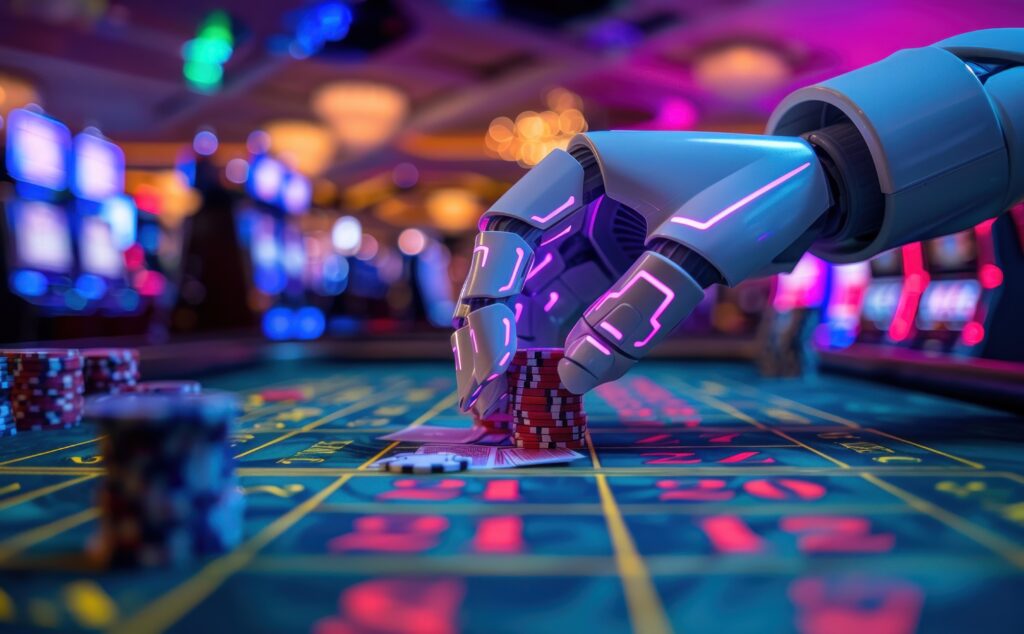The rise of artificial intelligence has transformed many industries, and online casinos are no exception. AI dealers—virtual croupiers powered by machine learning—are becoming increasingly common in digital gaming environments. They offer 24/7 availability, consistent performance, and can manage multiple games without fatigue. While these advantages are significant, the question remains: will AI dealers replace human dealers entirely, or simply serve as complementary features?
Beyond automating gameplay, AI opens doors to deeper personalization, including optimizing loyalty programs. For example, understanding how to make the Most of Bounties for Existing Players? Becomes easier with AI-driven analytics. By tracking player behavior in real time, casinos can deliver targeted bounty offers and timely rewards that boost retention and engagement. In this way, AI dealers not only enhance operational efficiency but also play a growing role in shaping personalized, data-informed casino experiences.
The Technology Behind AI Dealers
AI dealers combine computer vision, natural language processing, and decision-making algorithms to simulate the actions and interactions of human dealers. These systems can shuffle and deal cards, announce game outcomes, and respond to basic player inquiries in real time. Some platforms even employ realistic 3D avatars and voice synthesis to enhance immersion, making the gaming experience feel more engaging and lifelike.
The technology continuously improves through data-driven learning, enabling AI dealers to handle complex game scenarios with minimal errors. Unlike human dealers, AI can operate tirelessly without breaks, reducing operational costs for casinos and ensuring consistent gameplay around the clock. Additionally, AI systems can integrate seamlessly with backend analytics tools to monitor player activity, detect unusual patterns, and trigger customized promotions or bonuses mid-game, further enhancing engagement.
However, despite impressive technical advancements, AI dealers still lack genuine emotional intelligence and the nuanced social interactions that many players value during live casino experiences. For this reason, many platforms adopt a hybrid model—using AI to boost efficiency while preserving the human touch that creates trust, excitement, and connection at the gaming table.
Advantages of AI Dealers for Online Casinos
One of the primary benefits of AI dealers is scalability. Casinos can deploy AI across numerous tables simultaneously, catering to large volumes of players without staffing constraints. This flexibility allows operators to offer games around the clock, appealing to global audiences in different time zones. It also enables rapid expansion during peak hours or promotional events without logistical limitations.
AI dealers also enhance fairness and transparency by minimizing human error and eliminating potential biases or dealer misconduct. Furthermore, their consistent pace helps maintain game flow and reduces wait times. From a player’s perspective, AI dealers provide instant responses and seamless gameplay, contributing to a smooth user experience. Key advantages of AI dealers include:
- Unlimited scalability: Support thousands of simultaneous sessions with no additional staffing.
- 24/7 availability: No breaks or shift rotations required.
- Fairness and consistency: Every action is governed by certified algorithms.
- Cost efficiency: Reduces the need for human resources and training.
- Faster gameplay: AI ensures steady pacing and minimal downtime.
- Data integration: Real-time tracking enables adaptive gameplay and personalized offers.
Together, these benefits make AI dealers a strategic asset in the future of scalable, data-driven iGaming platforms.
Limitations and Player Preferences
Despite their advantages, AI dealers face significant challenges in replicating the social atmosphere of human dealers. Many players enjoy the personal interaction, charisma, and spontaneous banter that live dealers bring to the table. This human element fosters trust, emotional connection, and a sense of community, which AI currently cannot fully emulate.
Additionally, AI systems may struggle with interpreting complex or ambiguous player communication, limiting their responsiveness in dynamic social situations. For example, players may use sarcasm, slang, or culturally specific phrases that AI cannot accurately process, leading to awkward or impersonal interactions. While natural language processing continues to improve, it still falls short of replicating true conversational nuance.
Privacy concerns also arise when AI requires continuous data collection to improve performance. Players may feel uneasy knowing their behavior is constantly monitored, especially in jurisdictions with strict data protection laws. Consequently, some users prefer live dealer games featuring real humans who can provide authentic engagement without relying on surveillance-based personalization. This preference suggests that full replacement of human dealers remains unlikely in the near future, and that hybrid models may offer the best balance between efficiency and human connection.










Recent Comments